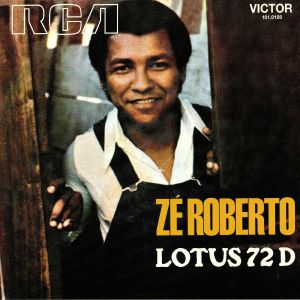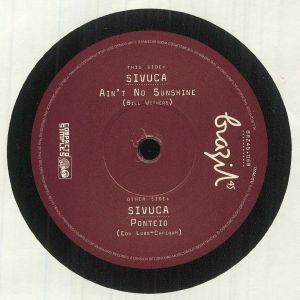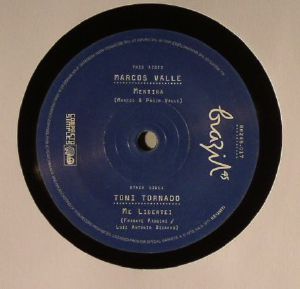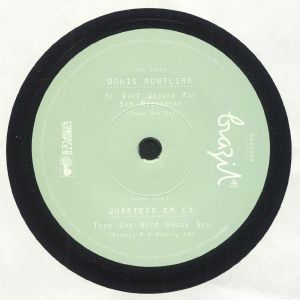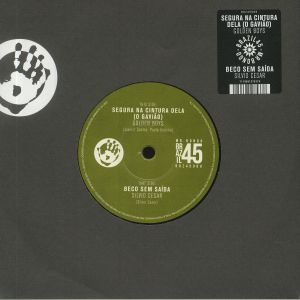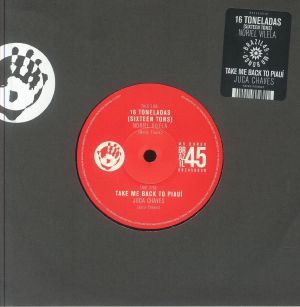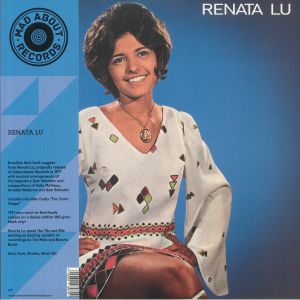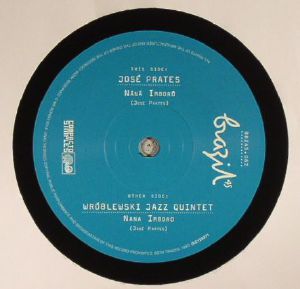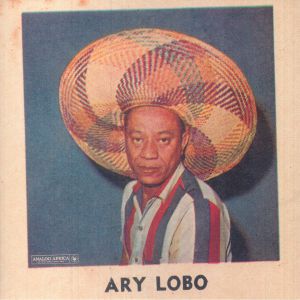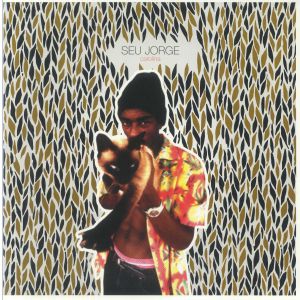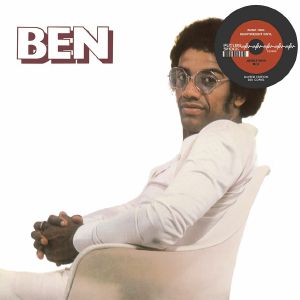Filter
Type
Featured
リリースタイトル
値段
Tags: MPB
Products tagged as MPB
1~12/12(ページ1/1)の商品
Review: Since its release in 1973, Ze Roberto's debut single "Lotus 72 D" has become something of an in-demand item amongst collectors of soul-fired Brazilian "MPB". So much so, in fact, that Mr Bongo has licensed it and served up this 7" reissue. In its original A-side form, the track is a carnival-ready slab of samba-soul brilliance rich in razor-sharp horn blasts, rich bass guitar, punchy hand-percussion and twinkling jazz piano solos. Roberto's confident vocals take centre stage, inviting us towards the dancefloor. Over on the flip you'll find a "Fast Version" of Roberto's tribute to 1972 Formula 1 champ Emerson Fittipaldi. This has a slightly more dancefloor-centric tempo, an effect achieved when it was accidentally pitched up for inclusion on a 2001 compilation.
… Read morePlayed by: Mukatsuku Records Chart, JimmyTheTwin, Dicky Trisco, Athens of the North (Fryer), Manu Archeo, RUSTAM OSPANOFF., Craig Charles Funk And Soul, Ionik (Traveller Records, KGS), Yoshi Okino (Kyoto Jazz Massive), Flash Atkins, Charlie bucket/ dancing in space, Juno Recommends International, Blair French, Kalita Records, Jake Stellarwell, Dino Soccio
… Read more in stock $15.51
Review: Amongst fans of Brazilian music, Sivuca is arguably best known for his 1973 cover of "Ain't No Sunshine" - later a favourite on the rare groove scene - which re-casts the Bill Withers classic as a sumptuous chunk of shuffling samba sunshine. Here, the track gets reissued as part of Mr Bongo's brilliant Brazil 45s series, alongside his lesser-known - but no less impressive - cover of Edu Lobo's "Ponteio".
… Read more in stock $12.47
Review: Two premium Latin funk documents on one limited 45, Mr Bongo deliver once again: Marcos Valle needs no introduction to Brazilian music enthusiasts. "Mentira" is a self-cover as Valle takes his 69 classic "Mentira Carioca" and develops the dynamic with a vocal style that's highly reminiscent of Donovan. Flip for Toni Tornado's Black Rio anthem "Me Libertei". Fusing sleazy rock n roll with jazzy Latin soul, madly this is the first time it's ever graced a 45!
… Read more in stock $12.47
Review: Mr Bongo's Brazilian 45 series hits it's ninth gear with two region-defining slices of sun-kissed samba soul. Doris takes the lead with delicate frontage. Leading from the front, all instruments follow her cues and mirror each vocal flourish with mild big band cheekiness. The instantly distinctive "Tudo Que Voce Podia Ser" from sister quartet Quarteto Em Cy is a great twist on a Latin classic with its slightly rocky guitars and full bodied harmonies. Previously released in 1972, a return has been long overdue.
… Read more in stock $12.47
Cat: BRZ 45089. Rel: 20 Jul 21
Funk
Review: Mr Bongo's essential Brazil 45s series notches up release number 89 via a blast of heavy dancefloor pressure that touches on both Brazilian funk and samba-rock. On the A-side you'll find Golden Boys' 1975 gem 'Segura Na Cintura Dela (O Gaviao)', an irresistible slab of full-throttle, orchestra-sporting, Hammond-heavy samba-funk marked out by strong group vocals and some superb musical arrangements. Over on the flip you'll find another classic from the same producer (Milton Miranda), Silvio Cesar's 1971 carnival masterpiece 'Beco Sem Saida' - an infectious excursion that found fame in the 2000s when Drumagick sampled it on 'Sambarock'.
… Read morePlayed by: Fabietto Delgado (Ankle Release)
in stock $12.47
Cat: BRZ 4503R. Rel: 20 Nov 24
International
Review: Mr. Bongo's Brazil.45 continues with a repress of two highly sought-after tracks from earlier in the series, this time from Noriel Vilela and Juca Chaves. On the A-side, Vilela's 1971 cover of Tennessee Ernie Ford's '16 Tons' transforms the classic American folk song into a smooth, samba-infused groove. Vilela's version reimagines the track which was originally released on Copacabana Records, with a deep rhythmic flair. On the B-side, Juca Chaves' 'Take Me Back To Piaui' from 1970 featured on his 1972 album Muito Vivo delivers lush orchestration, velvety vocals and vibrant cuica tones. It's pure escapist bliss.
… Read more in stock $10.81
Review: Renata Lu is a bit of an enigma. She made a couple of much loved albums in the 1970s and did some backing vocal work on cult records by stars such as Tim Maia and Nonato Buzar. Despite this, she never became a standalone star in the world of MPB and so remains a little known figure. Her self titled 1971 debut album on Copacabana Records was a heavyweight mix US soul and funk with spicy Latin percussion, all dropped over samba and boogaloo beats. It is high energy, with lots of big horns, electric piano riffs and angular bass as well as some swooning strings. This deluxe edition marks a real landmark in the world of funk carioca.
… Read morePlayed by: Afro Beat Foundation, Charlie bucket/ dancing in space
in stock $29.64
Review: The 62nd single in Mr Bongo's long-running Brazil 45s series is notable for containing Jose Prates' "Nana Imboro", a deep, hypnotic and intoxicating samba cut that was initially recorded and released way back in 1958. Relatively slow and steady by samba standards, its chanted refrain is thought to be the inspiration for Jorge Ben's much better known "Mas Que Nada". Wisely, Mr Bongo has backed Prates' sublime original with a 1960 cover by obscure Polish outfit Wroblewski Jazz Quintet. This dispenses with the chanting, instead increasing the number of intertwined horn parts. Given that original copies of the rare Polish EP it first appeared on will set you back serious money, it's great to see this fine cover included here.
… Read more in stock $12.47
1958-1966 (limited gatefold 180 gram vinyl LP + MP3 download code)
Cat: AADE 019. Rel: 01 Dec 23
International
Meus Guardados
Pedido A Padre Cicero
O Criador
Visite O Terreiro
Nego Sao
Review: Ary Lobo hails from the North of Brazil and has been considered something of a master of vocal indigenous styles like Baiao, Coco, Batuque and other related genres ever since he dropped his first album Forro con Ary Lobo in 1958. He suffered from prejudices against his northern musical styles throughout his career but still managed to eventually make his mark and become a real favourite and now Analog Africa has put together this vital and limited edition 180 gram gatefold album Ary Lobo 1958-1966 which collects his most standout works from all across a key eight-year period. A fine overview of an important figure in the evolution of Brazilian music.
… Read more in stock $34.91
Cat: BRZ45 01R. Rel: 22 Nov 24
International
Review: 'Deixa Eu Dizer' is a timeless Brazilian classic that was famously sampled by Marcelo D2 on his iconic hip-hop track 'Desafabo' and maybe just as notary, it was also the debut release on Mr Bongo's now much loved Brazil 45's imprint. It originally featured on Cizinha's stunning album of the same name and until Mr Bongo stepped in it had never been available on a 7". 'Deixa Eu Dizer' has been a long-standing favourite with deep diggers despite its mysterious origins and this welcome reissue not only celebrates Cizinha's unforgettable contribution to Brazilian music but also brings this beloved track to a new generation.
… Read morePlayed by: Juno Recommends International
in stock $10.53
Review: This timely reissue features a curated selection of standout tracks from Seu Jorge's acclaimed 2002 debut album Carolina (which was originally titled Samba Esporte Fino). The release marked the beginning of Jorge's international fame and was quickly followed by acting roles in City of God and Wes Anderson's The Life Aquatic where his Portuguese covers of the late great David Bowie became iconic. The record was co-produced by Mario Caldato of the Beastie Boys association and mixes up samba, funk and jazz into a timeless sound full of colour and soul for the warmer months of the year. Tracks like the anthemic title song, the funk-tinged 'Mangueira' and the infectious 'Tu Queria' remain essential showcases Seu Jorge's effortless musical charisma.
… Read morePlayed by: Juno Recommends International
in stock $23.26
Review: Jorge Ben is one of the most influential Brazilian artists of his era. The so-called samba king brought all new rule-breaking style to the genre - both musically and lyrically - and fomented his own freeform acid-samba spin-off over the course of an impossibly high number of albums. One of the problems is that many of them were all given the same name, including this one, Ben. Fortunately which ever one you pick up there is joy to be had. Here there are plenty of psychedelic head twisters such as the opener 'Morre O Burro Fica O Homem' as well as deer, more soulful cuts like 'Fio Maravilha'.
… Read more in stock $21.05
1~12/12(ページ1/1)の商品

 USD
USD





